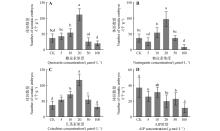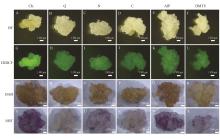Bulletin of Botanical Research ›› 2025, Vol. 45 ›› Issue (1): 130-138.doi: 10.7525/j.issn.1673-5102.2025.01.014
• Original Paper • Previous Articles
Wenhui GUO1, Yue WANG1, Lin WU2, Jianfei YANG1,3( ), Ling YANG1, Peng ZHANG1,3, Haibo WU1,4, Hailong SHEN1,4
), Ling YANG1, Peng ZHANG1,3, Haibo WU1,4, Hailong SHEN1,4
Received:2024-05-31
Online:2025-01-20
Published:2025-01-23
Contact:
Jianfei YANG
E-mail:yjf19910304@126.com
CLC Number:
Wenhui GUO, Yue WANG, Lin WU, Jianfei YANG, Ling YANG, Peng ZHANG, Haibo WU, Hailong SHEN. Effects of Exogenous Flavonoids on Embryogenic Callus Proliferation and Somatic Embryogenesis of Korean Pine[J]. Bulletin of Botanical Research, 2025, 45(1): 130-138.
Add to citation manager EndNote|Ris|BibTeX
URL: https://bbr.nefu.edu.cn/EN/10.7525/j.issn.1673-5102.2025.01.014

Fig.2
Effects of flavonoids and AIP treatments on somatic embryogenesis of Korean pineStatistical differences were determined using one-way ANOVA(P<0.05). Different lowercase letters(a,b,c,etc.) marked above the column indicate a significant difference between the means(LSD,P=0.05). The same as below.


Fig.3
Effects of different treatments on ROS levels in embryogenic callus of Korean pineA-F.Callus untreated(CK) and treated with 20 μmol·L-1 quercetin(Q),naringenin(N),catechin(C),AIP and DMTU,respectively,callus treated with DMTU was used as a positive control; G-L.Detection of ROS-specific fluorescent probe H2DCF in callus; M-R.DAB staining of callus with different treatments; S-X.NBT staining of callus.

| 1 | 高芳,沈海龙,刘春苹,等.红松成熟胚愈伤组织诱导外植体选择及培养条件优化[J].南京林业大学学报(自然科学版),2017,41(3):43-50. |
| GAO F, SHEN H L, LIU C P,et al.Optimization of culture conditions and selection of suitable explants for callus induction from mature embryo of Pinus koraiensis [J].Journal of Nanjing Forestry University(Natural Science Edition),2017,41(3):43-50. | |
| 2 | LELU-WALTER M A, THOMPSON D, HARVENGT L,et al.Somatic embryogenesis in forestry with a focus on Europe:state-of-the-art,benefits,challenges and future direction[J].Tree Genetics & Genomes,2013,9(4):883-899. |
| 3 | 周雪燕,高海燕,李召珉,等.基于生长与结实评价红松种子园亲本[J].植物研究,2020,40(3):376-385. |
| ZHOU X Y, GAO H Y, LI Z M,et al.Evaluating parents of Pinus koraiensis seeds orchard with growth and fruiting[J].Bulletin of Botanical Research,2020,40(3):376-385. | |
| 4 | 陈士刚,秦彩云,王聪慧,等.红松5个家系未成熟种子的胚性愈伤组织诱导研究[J].森林工程,2021,37(1):13-17. |
| CHEN S G, QIN C Y, WANG C H,et al.Embryogenic callus induction of Korean pine immature seeds from five families[J].Forest Engineering,2021,37(1):13-17. | |
| 5 | 闫平玉,王鹏,杨维满,等.红松种子园结实性状分析及优良无性系选择[J].森林工程,2020,36(6):19-29. |
| YAN P Y, WANG P, YANG W M,et al.Analysis of seeding characters of Korean pine seed orchard and selection of excellent clones[J].Forest Engineering,2020,36(6):19-29. | |
| 6 | PENG C X, GAO F, WANG H,et al.Physiological and biochemical traits in Korean pine somatic embryogenesis[J].Forests,2020,11(5):577. |
| 7 | GAO F, PENG C X, WANG H,et al.Selection of culture conditions for callus induction and proliferation by somatic embryogenesis of Pinus koraiensis [J].Journal of Forestry Research,2021,32:483-491. |
| 8 | 任毓辉,聂帅,彭春雪,等.红松胚性愈伤组织增殖的激素配比、糖源类型和增殖周期效应研究[J].植物研究,2022,42(4):704-712. |
| REN Y H, NIE S, PENG C X,et al.Effects of hormone combinations,carbon source type and proliferation cycle on embryogenic callus proliferation of Pinus koraiensis [J].Bulletin of Botanical Research,2022,42(4):704-712. | |
| 9 | PENG C X, GAO F, WANG H,et al.Optimization of maturation process for somatic embryo production and cryopreservation of embryogenic tissue in Pinus koraiensis [J].Plant Cell,Tissue and Organ Culture,2021,144(1):185-194. |
| 10 | PENG C X, GAO F, WANG H,et al.Suspension culture and somatic embryogenesis of Korean pine[J].Phyton-International Journal of Experimental Botany,2022,91(1):223-238. |
| 11 | GAO F, PENG C X, WANG H,et al.Key techniques for somatic embryogenesis and plant regeneration of Pinus koraiensis [J].Forests,2020,11(9):912. |
| 12 | NIE S, YAN Y, WANG Y,et al.Proper doses of brassinolide enhance somatic embryogenesis in different competent Korean pine cell lines during embryogenic callus differentiation[J].Frontiers in Plant Science,2024,15:1330103. |
| 13 | JOYNER P M.Protein adducts and protein oxidation as molecular mechanisms of flavonoid bioactivity[J].Molecules,2021,26(16):5102. |
| 14 | SAJID M, CHANNAKESAVULA C N, STONE S R,et al.Synthetic biology towards improved flavonoid pharmacokinetics[J].Biomolecules,2021,11(5):754. |
| 15 | 吕朝耕,王升,杨婉珍,等.2-氨基磷酸茚处理对新疆紫草悬浮细胞次生代谢物积累的影响[J].中国中药杂志,2017,42(8):1566-1571. |
| LÜ C G, WANG S, YANG W Z,et al.Secondary metabolic responses to treatment of 2-aminoindan-2-phosphonic acid in cell lines from Arnebia euchroma [J].China Journal of Chinese Materia Medica,2017,42(8):1566-1571. | |
| 16 | MAXIMOVA S N, FLOREZ S, SHEN X L,et al.Genome-wide analysis reveals divergent patterns of gene expression during zygotic and somatic embryo maturation of Theobroma cacao L.,the chocolate tree[J].BMC Plant Biol,2014,14(1):185. |
| 17 | PENG C X, GAO F, TRETYAKOVA I N,et al.Transcriptomic and metabolomic analysis of Korean pine cell lines with different somatic embryogenic potential[J].International Journal of Molecular Sciences,2022,23(21):13301. |
| 18 | IMIN N, GOFFARD N, NIZAMIDIN M,et al.Genome-wide transcriptional analysis of super-embryogenic Medicago truncatula explant cultures[J].BMC Plant Biology,2008,8(1):110. |
| 19 | GUO H H, GUO H X, ZHANG L,et al.Metabolome and transcriptome association analysis reveals dynamic regulation of purine metabolism and flavonoid synthesis in transdifferentiation during somatic embryogenesis in cotton[J].International Journal of Molecular Sciences,2019,20(9):2070. |
| 20 | WANG L C, LIU N, WANG T Y,et al.The GhmiR157a–GhSPL10 regulatory module controls initial cellular dedifferentiation and callus proliferation in cotton by modulating ethylene-mediated flavonoid biosynthesis[J].Journal of Experimental Botany,2018,69(5):1081-1093. |
| 21 | DOWNEY C D, ZOŃ J, JONES A M P.Improving callus regeneration of Miscanthus × giganteus J.M.Greef,Deuter ex Hodk.,Renvoize‘M161’callus by inhibition of the phenylpropanoid biosynthetic pathway[J].In Vitro Cellular & Developmental Biology-Plant,2019,55(1):109-120. |
| 22 | BAMNESHIN M, MIRJALILI M H, NAGHAVI M R,et al.Gene expression pattern and taxane biosynthesis in a cell suspension culture of Taxus baccata L.subjected to light and a phenylalanine ammonia lyase(PAL) inhibitor[J].Journal of Photochemistry and Photobiology B:Biology,2022,234(14):112532. |
| 23 | 谢添伊.外源抗坏血酸和过氧化氢调控水曲柳褐化和体胚发生机制研究[D].哈尔滨:东北林业大学,2021. |
| XIE T Y.Mechanism of exogenous ascorbic acid and hydrogen peroxide regulating browning and somatic embryogenesis of Fraxinus mandshurica [D].Harbin:Northeast Forestry University,2021. | |
| 24 | 徐松华.逆境条件下植物体内活性氧代谢研究进展[J].安徽农学通报,2021,27(21):29-32. |
| XU S H.Research advances of reactive oxygen species in plants under environmental stress[J].Anhui Agricultural Science Bulletin,2021,27(21):29-32. | |
| 25 | LEWIS D R, RAMIREZ M V, MILLER N D,et al.Auxin and ethylene induce flavonol accumulation through distinct transcriptional networks[J].Plant Physiology,2011,156(1):144-164. |
| 26 | 夏凯丽,刘婷,杨静慧,等.黑莓体细胞胚诱导中的细胞生理特性[J].中国南方果树,2018,47(1):114-118. |
| XIA K L, LIU T, YANG J H,et al.Cellular physiological properties in blackberry somatic embryo induction[J].South China Fruits,2018,47(1):114-118. | |
| 27 | 任宁,邹梦雯,陈冠群,等.不同成胚能力的百子莲愈伤组织中氧化还原水平的差异分析[J].分子植物育种,2022,20(4):1281-1288. |
| REN N, ZOU M W, CHEN G Q,et al.Difference analysis of redox levels in the callus of Agapanthus praecox ssp. orientalis with different embryogenic ability[J].Molecular Plant Breeding,2022,20(4):1281-1288. | |
| 28 | WANG Y, CAO S L, SUI X Y,et al.Genome-wide characterization,evolution,and expression analysis of the ascorbate peroxidase and glutathione peroxidase gene families in response to cold and osmotic stress in Ammopiptanthus nanus [J].Journal of Plant Growth Regulation,2023,42(1):502-522. |
| 29 | LI S C.Novel insight into functions of ascorbate peroxidase in higher plants:more than a simple antioxidant enzyme[J].Redox Biology,2023,64:102789. |
| 30 | 周小华,李昆志,赵峥,等.外源抗坏血酸对水稻抗铝生理指标的影响[J].热带作物学报,2021,42(3):769-776. |
| ZHOU X H, LI K Z, ZHAO Z,et al.Effects of exogenous ascorbic acid on physiological indexes in rice under aluminum stress[J].Journal of Tropical Crops,2021,42(3):769-776. | |
| 31 | GAO F, WANG R R, SHI Y J,et al.Reactive oxygen metabolism in the proliferation of Korean pine embryogenic callus cells promoted by exogenous GSH[J].Scientific Reports,2023,13(1):2218. |
| [1] | Yitong LUAN, Niansen LI, Lujing QIAO, Cunyong JU, Tijiu CAI, Peili SUN. Niches, Interspecific Associations and Community Stability of Dominant Tree Species of Piceakoraiensis-Abies nephrolepis-Pinus koraiensis Forest [J]. Bulletin of Botanical Research, 2024, 44(5): 753-762. |
| [2] | Xuelai WANG, Xiaoting LIU, Liran WANG, Shitong LI, Taijin ZHANG, Jiafeng ZHANG, Jinghua XU, Guanzheng QU, Xiyang ZHAO. Coupling Evaluation of Growth and Wood Properties of Pinus koraiensis Half-sib Families [J]. Bulletin of Botanical Research, 2024, 44(4): 554-564. |
| [3] | Nan LI, Xiaoxia TIAN, Peichun MAO, Mingli ZHENG, LIN MENG, Lan YUN. Phenotype and Pigment Analysis of Flower Organs of Iris lactea var. chinensis [J]. Bulletin of Botanical Research, 2024, 44(1): 51-61. |
| [4] | Zhezhe LI, Yidan ZHANG, Bo WANG, Zhenghao WANG, Lu WANG, Beibei CHENG. Changes and Influencing Factors of Anthocyanins in Hibiscus syriacus During Flowering [J]. Bulletin of Botanical Research, 2023, 43(4): 550-561. |
| [5] | Na LI, Xiaonan WANG. Screening and Phenotypic Identification of Seed Coat Pigmentation Mutants in Arabidopsis thaliana [J]. Bulletin of Botanical Research, 2023, 43(1): 59-68. |
| [6] | Mengqiao GUO, Xuanyu CHEN, Senrong HONG, Jiao LI, Jie FAN, Xinyu CHENG. The Correlation Between Leaf Phenotype Diversity and Total Flavonoids Content of Overground Part of Tetrastigma hemsleyanum Diels & Gilg [J]. Bulletin of Botanical Research, 2022, 42(5): 876-885. |
| [7] | Yuhui REN, Shuai NIE, Chunxue PENG, Ling YANG, Hailong SHEN. Effects of Hormone Combinations, Carbon Source Type and Proliferation Cycle on Embryogenic Callus Proliferation of Pinus koraiensis [J]. Bulletin of Botanical Research, 2022, 42(4): 704-712. |
| [8] | Qiyang Gao, Yulong Huang, Wenbing Guo, Fencheng Zhao, Yang Liu. Effects of Carbon Source and Other Factors on the Proliferation of Embryogenic Callus of Elite Clone of Pinus elliottii [J]. Bulletin of Botanical Research, 2022, 42(1): 21-28. |
| [9] | Zhi-Gang WEI, De-An XIA, Rui-Qi Wang, Yang ZHANG, Ying-Ying Liu, Ruo-Lin LI, Chuan-Ping YANG. Provenance Test of Pinus koraiensis in Different Types of Natural Secondary Forests in Xiaoxing’an Mountains [J]. Bulletin of Botanical Research, 2021, 41(5): 807-815. |
| [10] | Chun-Xue PENG, Xue-Mei CUI, Hai-Long SHEN. Callus Induction and Somatic Embryogenesis and Physiological State Analysis from Mature Zygotic Embryo Explant of Syringa reticulata var. mandshurica [J]. Bulletin of Botanical Research, 2021, 41(4): 557-563. |
| [11] | Fang WANG, Zhi-Min LU, Jun WANG, Shi-Kai ZHANG, Yu-Xi LI, Shao-Chen LI, Jian-Qiu ZHANG, Yu-Chun YANG. Photosynthetic and Stomatal Characteristics of Pinus koraiensis and P.sibirica under Low Temperature Stress [J]. Bulletin of Botanical Research, 2021, 41(2): 205-212. |
| [12] | Yong-Mei MIAO, Yuan Tong, Da Fang, Yu-Hao Wang. Effects of Rare Earth Element Lanthanum on Adventitious Buds Induction, Plantlets Growth and Synthesis of Secondary Metabolites of Dendrobium officinale [J]. Bulletin of Botanical Research, 2020, 40(6): 839-845. |
| [13] | ZHOU Xue-Yan, GAO Hai-Yan, LI Zhao-Min, ZHAO Yin-Kun, GE Li-Li, HOU Qing-Wen, DING Wen-Ya, ZHAO Xi-Yang. Evaluating Parents of Pinus koraiensis Seeds Orchard with Growth and Fruiting [J]. Bulletin of Botanical Research, 2020, 40(3): 376-385. |
| [14] | LI Xiang, FAN Zuo-Yi, WANG Jing-Yuan, WANG Qi, LI Xi-Peng, WANG De-Qiu, KONG Ling-Yuan, CAO Sen-Lin, MENG Qing-Gang, ZHAO Xi-Yang. Codon Usage Bias of Chalcone Synthase Gene CHS in Pinus koraiensis [J]. Bulletin of Botanical Research, 2020, 40(3): 447-457. |
| [15] | ZHANG Qin-Hui, WANG Hong-Wu, JIANG Guo-Yun, SHEN Guang, WANG Lian-Kui, LI Yan-Long, WANG Lei, WANG Li-Xiang, LI Yue-Ji, LI Rui, ZHAO Xi-Yang. Variation Analysis and Selection of Pinus koraiensis Half-sib Families [J]. Bulletin of Botanical Research, 2019, 39(4): 557-567. |
| Viewed | ||||||
|
Full text |
|
|||||
|
Abstract |
|
|||||